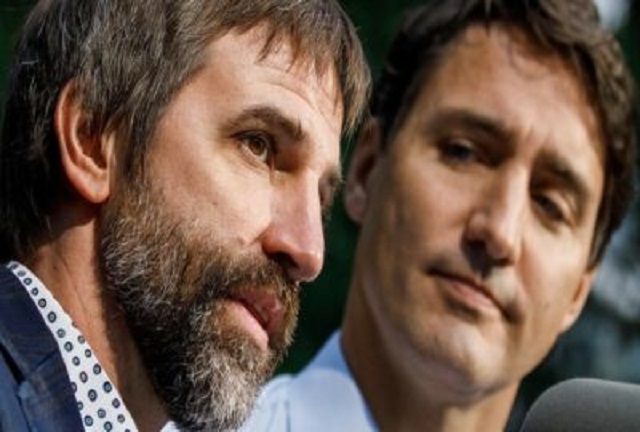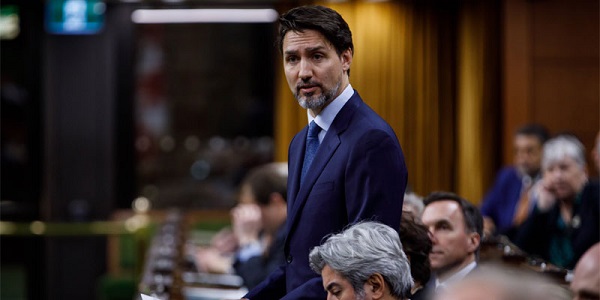Economy
Ottawa’s new ‘climate disclosures’ another investment killer

From the Fraser Institute
By Matthew Lau
The Trudeau government has demonstrated consistently that its policies—including higher capital gains taxes and a hostile regulatory environment—are entirely at odds with what investors want to see. Corporate head offices are fleeing Canada and business investment has declined significantly since the Trudeau Liberals came to power.
According to the Trudeau government’s emissions reduction plan, “putting a price on pollution is widely recognized as the most efficient means to reduce greenhouse gas emissions.” Fair enough, but a reasonable person might wonder why the same politicians who insist a price mechanism (i.e. carbon tax) is the most efficient policy recently announced relatively inefficient measures such “sustainable investment guidelines” and “mandatory climate disclosures” for large private companies.
The government claims that imposing mandatory climate disclosures will “attract more private capital into Canada’s largest corporations and ensure Canadian businesses can continue to effectively compete as the world races towards net-zero.” That is nonsense. How would politicians Ottawa know better than business owners about how their businesses should attract capital? If making climate disclosures were a good way to help businesses attract capital, the businesses that want to attract capital would make such disclosures voluntarily. There would be no need for a government mandate.
The government has not yet launched the regulatory process for the climate disclosures, so we don’t know exactly how onerous it will be, but one thing is for sure—the disclosures will be expensive and unnecessary, imposing useless costs onto businesses and investors without any measurable benefit, further discouraging investment in Canada. Again, if the disclosures were useful and worthwhile to investors, businesses seeking to attract investment would make them voluntarily.
Even the government’s own announcement casts doubt that increasing business investment is the likely outcome of mandatory climate disclosures. While the government says it’s “sending a clear signal to corporate boards and shareholders, at home and around the world, that Canada is their trusted partner for putting private capital to work in the race to net-zero,” most investors are not looking to put private capital to work to combat climate change. Most investors want to put their capital to work to earn a good financial return, after adjusting for the risk of the investment.
This latest announcement should come as no surprise. The Trudeau government has demonstrated consistently that its policies—including higher capital gains taxes and a hostile regulatory environment—are entirely at odds with what investors want to see. Corporate head offices are fleeing Canada and business investment has declined significantly since the Trudeau Liberals came to power. Capital per worker in Canada is declining due to weak business investment since 2015, and new capital per-Canadian worker in 2024 is barely half of what it is in the United States.
It’s also fair to ask, in the face of these onerous polices—where are the environmental benefits? The government says its climate disclosures are needed for Canada to progress to net-zero emissions and “uphold the Paris climate target of limiting global warming to 1.5°C above pre-industrial levels,” but its net-zero targets are neither feasible nor realistic and the economics literature does not support the 1.5 degrees target.
Finally, when announcing the new climate disclosures, Trudeau Environment Minister Steven Guilbeault said they are an important stepping stone to a cleaner economy, which is a “major economic opportunity.” Yet even the Canada Energy Regulator (a federal agency) projects net-zero policies would reduce real GDP per capita, increase inflation of consumer prices and reduce residential space (in other words, reduce living standards).
A major economic opportunity that will increase business investment? Surely not—mandatory climate disclosures will only further reduce our standard of living and impose useless costs onto business and investors, with the sure effect of reducing investment.
Author:
Business
Trudeau’s new tax package gets almost everything wrong

From the Fraser Institute
Recently, Prime Minister Justin Trudeau announced several short-term initiatives related to tax policy. Most notably, the package includes a two-month GST holiday on certain items and a one-time $250 cheque that will be sent to all Canadians with incomes under $150,000.
Unfortunately, the Trudeau government’s package is a grab bag of bad ideas that will not do anything to get Canada out of the long-term growth rut in which our economy is mired. There are too many to list all in one place, but here are four of the biggest problems with Prime Minister Trudeau’s tax plan.
- It reduces the wrong taxes. When it comes to economic growth, not all taxes are created equal. Some cause far more economic harm per dollar of government revenue raised than others. The government’s package creates a holiday on the GST for some items (only for two months) which is a mistake given that the GST is one of the least economically harmful components of the tax mix. Canada’s recent growth record is abysmal, and boosting growth should be a primary goal of any changes to tax policy. A GST cut of any duration fails this test relative to other tax cuts.
- Temporary tax holidays shift consumption in time, they don’t boost growth. The government’s GST reduction is actually a short-term tax holiday on certain items that will last two months. There are decades worth of economic research showing that when governments create short-term tax breaks, they may change the timing of consumption, but they won’t contribute to actual economic growth. Shifting consumption from the future to the present won’t help get Canada out of the economic doldrums. This is particularly true of the Trudeau tax holiday since purchases that Canadians may have made after the two-month holiday period will simply be shifted forward to take advantage of the absence of the GST. As noted above, there are better taxes to cut than the GST, but no matter what taxes we are talking about permanent reductions are vastly superior to temporary tax cuts like short-term holidays.
- One-time tax rebates don’t improve economic incentives. Perhaps the worst element of the Trudeau government’s announcement was a plan to send $250 cheques to all Canadians earning under $150,000. One-time tax rebates are a terrible way to provide tax relief. When you cut income tax rates, you improve incentives for people to work and invest because they get to keep a larger share of their earnings. This helps the economy grow. One-time rebates that you get regardless of the economic choices you make has no similar effect. This means that the rebate with its $4.7 billion price tag won’t help Canada’s poor growth performance.
- It borrows from the future to give to the present. The federal government is currently running a large deficit. This raises the question of who will have to pay the $4.7 billion bill for the one-time payments announced today. The answer is that the government will have to borrow the money and therefore future taxpayers will have to either pay it off or service the extra debt indefinitely. The money the Trudeau government will send out won’t come out of thin air, it’ll have to be borrowed with the burden falling on future taxpayers.
The Trudeau government got one thing conceptually right, which is that there are advantages to reducing the tax burden on Canadians. Unfortunately, the policy package it has put forward to provide tax relief gets everything wrong. It reduces the wrong taxes, shifts taxes temporally rather than cutting them, does nothing to improve economic incentives, and burdens future taxpayers. With the holiday season around the corner, this attempt at a gift to Canadian taxpayers is the economic equivalent of a lump of coal in the stocking.
Authors:
Business
Carbon tax bureaucracy costs taxpayers $800 million

From the Canadian Taxpayers Federation
By Ryan Thorpe
The cost of administering the federal carbon tax and rebate scheme has risen to $283 million since it was imposed in 2019, according to government records obtained by the Canadian Taxpayers Federation.
By 2030, the cost of administering the carbon tax is expected to total $796 million, according to the records.
“Not only does the carbon tax make our gas, heating and groceries more expensive, but taxpayers are also hit with a big bill to fund Prime Minister Justin Trudeau’s battalion of carbon tax bureaucrats,” said Franco Terrazzano, CTF Federal Director. “Trudeau should make life more affordable and slash the cost of the bureaucracy by scrapping the carbon tax.”
The government records were released in response to an order paper question from Conservative MP John Barlow (Foothills).
The carbon tax and rebate scheme cost taxpayers $84 million in 2023, according to the records.
There were 461 federal bureaucrats tasked with administering the carbon tax and rebate scheme last year, according to the records.
The CTF previously reported administering the carbon tax cost taxpayers $199 million between 2019 and 2022.
Projected costs for administering the carbon tax and rebate scheme between 2024 and 2030 are $513 million, according to the records.
That would bring total administration costs for the carbon tax and rebate scheme up to $796 million by 2030.
But the true hit to taxpayers is even higher, as the records do not include costs associated with the Fuel Charge Tax Credit for Farmers or the Canada Carbon Rebate for Small Businesses.
“It’s magic math to believe the feds can raise taxes, skim hundreds-of-millions off the top to hire hundreds of new bureaucrats and then somehow make everyone better off with rebates,” Terrazzano said.
The carbon tax will cost the average household up to $399 this year more than the rebates, according to the Parliamentary Budget Officer, the government’s independent, non-partisan budget watchdog.
The PBO also notes that, “Canada’s own emissions are not large enough to materially impact climate change.”
The government also charges its GST on top of the carbon tax. The PBO report shows this carbon tax-on-tax will cost taxpayers $400 million this year. That money isn’t rebated back to Canadians.
The carbon tax currently costs 17 cents per litre of gasoline, 21 cents per litre of diesel and 15 cents per cubic metre of natural gas.
By 2030, the carbon tax will cost 37 cents per litre of gasoline, 45 cents per litre of diesel and 32 cents per cubic metre of natural gas.
-

 ESG2 days ago
ESG2 days agoCan’t afford Rent? Groceries for your kids? Trudeau says suck it up and pay the tax!
-

 John Stossel2 days ago
John Stossel2 days agoGreen Energy Needs Minerals, Yet America Blocks New Mines
-

 Daily Caller2 days ago
Daily Caller2 days agoLos Angeles Passes ‘Sanctuary City’ Ordinance In Wake Of Trump’s Deportation Plan
-

 Alberta2 days ago
Alberta2 days agoProvince considering new Red Deer River reservoir east of Red Deer
-

 Addictions2 days ago
Addictions2 days agoBC Addictions Expert Questions Ties Between Safer Supply Advocates and For-Profit Companies
-

 Aristotle Foundation1 day ago
Aristotle Foundation1 day agoToronto cancels history, again: The irony and injustice of renaming Yonge-Dundas Square to Sankofa Square
-

 conflict1 day ago
conflict1 day agoUS and UK authorize missile strikes into Russia, but are we really in danger of World War III?
-

 armed forces24 hours ago
armed forces24 hours agoJudge dismisses Canadian military personnel’s lawsuit against COVID shot mandate







